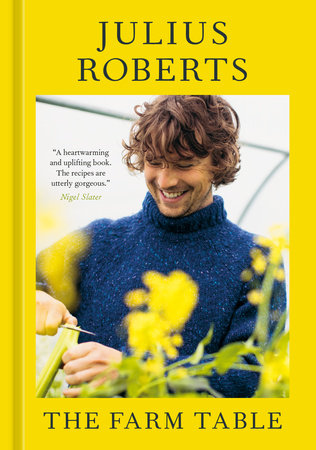Introduction It’s a sharp winter morning. We’re in the midst of a bitterly cold week and the fields that stretch across my window are gilded in silver frost. I can see the goats huddled in a patch of sun trying to absorb what little warmth the light has to offer, there’s not a breath of wind, just the brave sound of a robin piercing the quiet like shattered glass. My window looks out across the entrance to the farm, three field maples cluster around a cattle grid banked by a rickety fence entwined in a tangle of wild roses. There ’s the usual mess of a farm, a disheveled skip, a few rusty bikes and piles of fence posts leaning against an old pig ark now home to a wild cat. I can see my chickens scratching away at the frozen ground, with feathers fluffed up to protect against the cold. And looking through a network of branches, my sheep are grazing in the field ahead, their black woolly coats like coal smudges on the short green grass. There’s a busy day ahead, a goat with a limp to fix, hay racks to fill, a rabbit wreaking havoc in the polytunnel and seeds to order for the year ahead.
It all started with four pigs . . . Snap, Crackle, Pop and Alby. I’d been working at London restaurant Noble Rot for just under a year and was beginning to realize that restaurant life wasn’t quite what I was looking for. I loved the learning, the camaraderie and the excitement of it all, but the crushing hours, lack of sleep and stress just didn’t seem sustainable. Noble Rot is one of those great restaurants where at its core the cooking is simple and all about letting quality ingredients shine. I’d always been fascinated by our head chef ’s constant search for new suppliers and the best produce: dayboat fish from Cornwall that would arrive taut with rigor, the veg supplier who maintained her fields and planted seeds using old machines pulled by powerful horses, and the poaching forager who always found the best mushrooms. Each morning twinkly-eyed and smiling growers would turn up with their boxes and crates of glistening produce. The juiciest tomatoes you’ve ever seen, trays of thorny artichokes, blueskinned pumpkins sealed with red wax and whole lambs slowly reared on permanent organic pasture. It set a thought in motion: they’re outside all day, tanned and healthy, whereas I’m here, skin a shade somewhere between yellow and gray, living off coffee and spending my day stressed to the core in a windowless kitchen.
So I formed a plan to leave the city on a mission to grow my own food and reconnect with the natural world. I’d spent much of my childhood in the country exploring the woods, hunting rabbits and building bonfires. But initially I was scared to make the leap, and so after leaving the restaurant I lingered around London for a while, unable to leave my friends and the safety of the city I’d grown up in. Eventually, and after much encouragement, I packed my bag and off I went with my dog, Loki, in tow.
I moved into my parents’ cottage in Suffolk, east of London, and started private catering to make ends meet with the goal of turning our home into a smallholding. As I’d moved in the depths of January, the ground was frozen solid and too hard to begin digging or growing. Chickens don’t lay through winter and didn’t feel like enough of a commitment to this new way of life, but I’d heard pigs were a joy to look after. They seemed like a bold first step that would keep me rooted to this plan long enough that I wouldn’t bail without giving it a proper go. So I started searching online and went to meet a lady who kept Mangalitsas, a hairy rare-breed pig famed for its dark marbled meat, which was particularly good for curing. Convinced by their joyful pigginess, I put a deposit down on four piglets that would be ready to leave in a few weeks, giving me just enough time to build a pen in the woods and get ready for their arrival.
She turned up with no trailer, just the little pigs in dog crates crammed in the back of a bashed-up Subaru. I’ll never forget that piggy whiff as she opened the doors and her beaming smile when she saw the rickety home we’d built for them. We couldn’t get the car close enough to the pen, which was deep in woodland at the bottom of a steep brambly hill. She said not to worry, and one by one, grabbed the piglets by their back legs and wheelbarrowed them down the hill into the pen. They kicked up such a fuss screaming at the top of their lungs, so loud you wouldn’t believe it. But the second she let go and their noses realized where they’d landed, an instant calm came over them as if they’d come home. There was a smile in their eyes and a spring in their furry bottoms as strong noses dug deep into rich soil and came out black and crunching with acorns. They moved in a line plowing through the knee-deep carpet of rusty fallen oak leaves, unearthing all manner of things.
I spent that first month glued to those pigs–and would have camped down there with them if it hadn’t been so cold. They were like teenagers, bubbling with character and individuality. I often caught them fast asleep in the morning and they’d wake with a shocked grunt as I tipped a bucket of apples into their pen. They’d play with Loki, chasing him in circles round the enclosure, craved affection and would beg to be scratched, lying beside me for hours with their eyes closed and long black lashes fluttering with happiness.
Something began to click right from the start with those wonderful pigs, a thought that had begun with the quest for great produce at the restaurant and the stories from those growers. Why are we so disconnected and distant from where our food comes from and the animals in our care? We’ve all grown up with nursery rhymes and a love for farm animals–they feel so familiar, but in truth their cleverness, sensitivity and character are completely glossed over. I was sitting in the pen with an overwhelming love for those pigs, awed by their individuality and intelligence, shocked at how similar they were to my dog and alarmed by the fact that one day I would have to take them to their death.
Wrestling with that knowledge was a very tricky thing. People always say, don’t name your pigs–you’ll get too attached, which will make it too hard at the end. But I think that’s absolute nonsense.
Get attached, love them, appreciate them and give them the absolute best life they can live. I don’t disagree with eating meat, there is a food chain in life, but I do absolutely disagree with animals suffering
so that we can eat meat. Terrified by the day to come, I delayed it for years. What really began to sadden me was the reality of now knowing just how brilliant these animals were and the misery in which most of them live. That became my mission, not to preach and shout from the rooftops, picking sides and getting into arguments online, but to show these animals for what they really are: sentient, intelligent and beautiful creatures. Documenting the love between a boy and his pigs in the hope that it would make people think twice about the way they shop and the impact that has. I think it’s hard to motivate someone to stop eating meat, but persuading them to think about the meat they do eat is easy. It’s all about quality, not quantity–eat less meat and with the money you save buy it from an animal that has lived a good life. If we all ate less, the impact on the planet would be significantly reduced, leaving more room for slower-growing holistic farms that exist in harmony with nature.
A love of these pigs and the lessons they were teaching me cemented the journey I was on, and four pigs quickly turned into chickens, growing veg, my first goats and a small flock of sheep. With each of these new additions came an endless string of hard knocks, mistakes and joyful learning. I assisted my first births, watched a beloved goat mourn her stillborn baby and made the mistake of buying cheap compost that had me pulling my hair out in frustration as a carpet of weeds took over the veg patch. While initially I was very much on my own out there, I think the connection to nature and these valuable lessons in the old ways of living started to rub off on my friends and family, and before long everyone was chipping in with the weeding, mucking out pigs and enjoying fresh eggs each morning. Soon, however, my flock had outgrown our little plot. We’d always had plans to move toward family in the much lusher and pastoral west of England, and this new way of life gave us the momentum that we needed.
Copyright © 2024 by Julius Roberts. All rights reserved. No part of this excerpt may be reproduced or reprinted without permission in writing from the publisher.




















